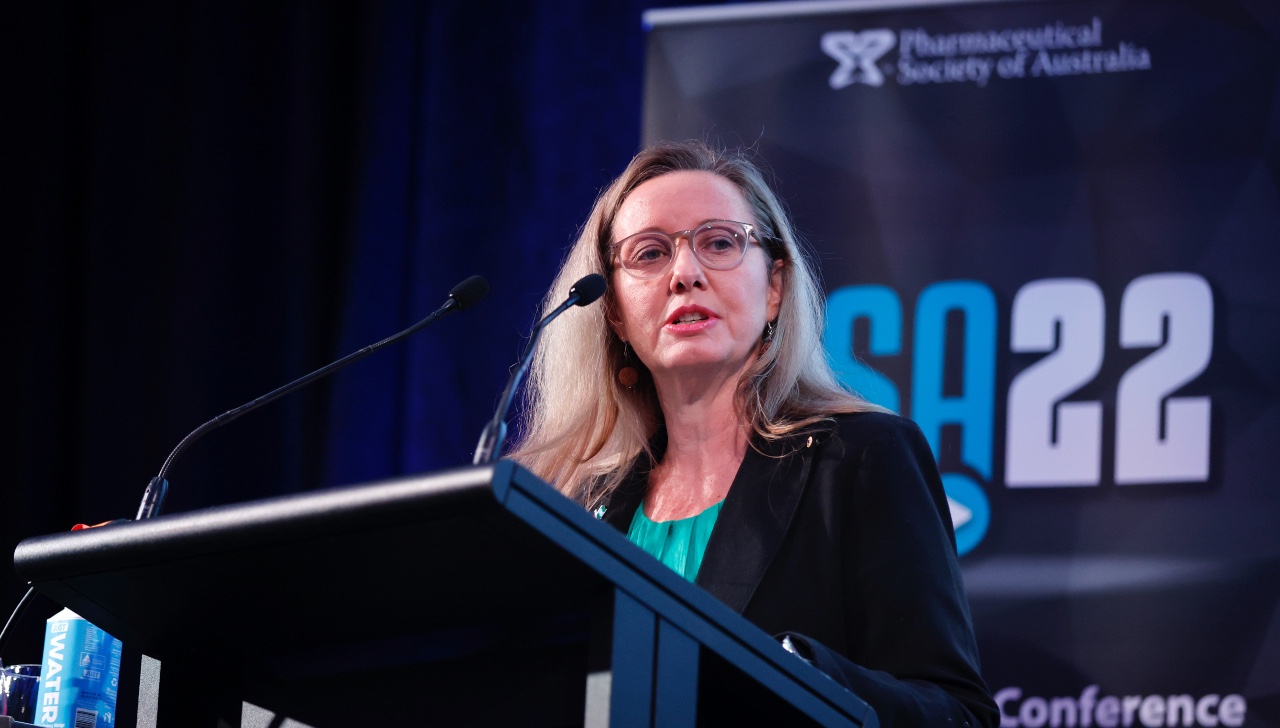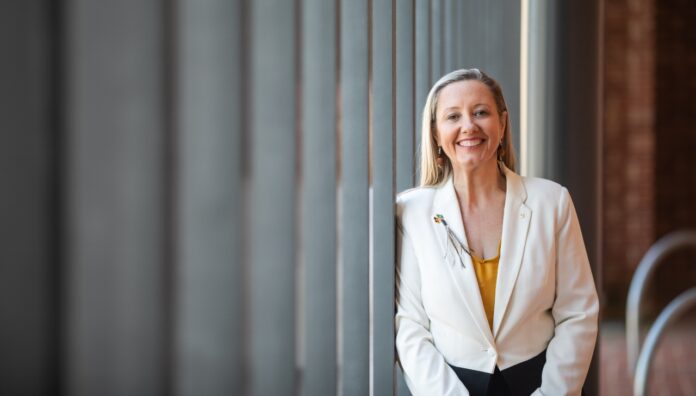Along with winning Pharmacist of the Year at PSA’s Excellence Awards, presented at PSA22, Faye McMillan MPS will shortly become Professor of Indigenous Health at Sydney’s University of Technology.
But growing up in remote NSW, Wiradjuri woman Associate Professor Faye McMillan AM MPS never expected a career in pharmacy – let alone becoming the first Aboriginal registered pharmacist.
Working as a pharmacy assistant in the local pharmacy in Trangie, about 75 kilometres from Dubbo in central west New South Wales, Faye McMillan enjoyed interacting with the local community. ‘People would come in just to talk about how their day was going or if something significant had happened in the town,’ she says. ‘It really was such a wonderful place to be.’
Encouraged by the pharmacist she worked with, A/Prof McMillan became a dispensary technician before deciding to study pharmacy as a mature-aged student at 27. Her time at Charles Sturt University (CSU) was ‘a struggle’.
When her sister was diagnosed with terminal cancer, A/Prof McMillan’s first thought was that she would drop out. But her lecturers and other students rallied around her and she ultimately made it through the degree. ‘The subjects were hard but the people were amazing,’ she says. ‘And to me, that’s what pharmacy is.’

After graduating in 2001, A/Prof McMillan did her intern year at a community pharmacy in Wagga Wagga. She became fully registered in 2002, unknowingly becoming the first Aboriginal person in Australia to do so.
‘For me personally, I didn’t think about it … But when it was pointed out to me, I felt a sense of obligation as part of the Aboriginal and Torres Strait Islander community to take it on,’ she says. ‘That opportunity to say that you’re the first, it adds a certain weight to experiences.’
Connecting with Country
After registration, A/Prof McMillan worked for the Aboriginal and Torres Strait Islander Commission, before a 6-month stint at a community pharmacy in the Tiwi Islands.
She describes this as ‘one of the best things to happen’ and an experience that cemented her desire to work in rural locations. She was also driven to help promote the inclusion of Aboriginal and Torres Strait Islander people within pharmacy and the wider health sector. This led her to the world of academia, including as a lecturer in CSU’s Department of Rural Health, which involved facilitating placements for pharmacists in rural and remote Australia.
A/Prof McMillan has since worked at a number of institutions and will soon take up a position at the University of Technology Sydney (UTS). But she has ensured she’s never too far from home.
‘I’ve negotiated with UTS not to leave my home community, because when I think about work-life balance, it’s being able to live on Country that I know I need to make me happy,’ she says.
Cutting through
Although pharmacy is a diverse profession in some ways, with women making up 63% of registered pharmacists, it falls short in other areas, A/Prof McMillan says.
Among achievements that include being awarded the Member of the Order of Australia (AM) and 2019 NSW Aboriginal Woman of the Year, she says it is launching the Leaders in Indigenous Pharmacy Profession Education Network of which she’s most proud. This is a group dedicated to transforming the pharmacist workforce by promoting the inclusion of First Nations’ perspectives in pharmacy education.
Aboriginal and Torres Strait Islander people in pharmacy make up less than 1%, yet as A/Prof McMillan points out, ‘we’re over 3% of the population’.
‘We’ve got to do better,’ she says. ‘I certainly won’t make a clear and paved pathway for the next generation, but I might be able to get in there with a machete and get the undergrowth out so that it’s easier.’
Q&A1. Where will you be in 5 years? Coming towards the end of my career, still working in community pharmacy and still prioritising regional work. 2. What is your best advice for other pharmacists? Fail. For every success, there are so many attempts. Don’t be afraid to fail. They’re not failures – they’re just learning opportunities. 3. What medicine do you find the most fascinating and why? Due to the personal experiences of cancer in my family, for me, it’s the field of oncology and the medicines in that field. 4. What do you think has been the biggest achievement of the profession since 2019? Participation as part of multidisciplinary teams during the pandemic. 5. What should be a priority of the next plan for pharmacists? Increasing the participation of Aboriginal and Torres Strait Islander people. |



 John Jones MPS, pharmacist immuniser and owner of My Community Pharmacy Shortland in Newcastle, NSW[/caption]
John Jones MPS, pharmacist immuniser and owner of My Community Pharmacy Shortland in Newcastle, NSW[/caption]


 Debbie Rigby FPS explaining how to correctly use different inhaler devices[/caption]
Debbie Rigby FPS explaining how to correctly use different inhaler devices[/caption]




 Professor Sepehr Shakib[/caption]
Professor Sepehr Shakib[/caption]

 Lee McLennan MPS[/caption]
Lee McLennan MPS[/caption]
 Dr Natalie Soulsby FPS, Adv Prac Pharm[/caption]
Dr Natalie Soulsby FPS, Adv Prac Pharm[/caption]
 Joanne Gross MPS[/caption]
Joanne Gross MPS[/caption]








